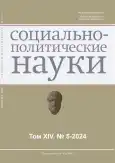Some aspects of the military policy of modern Russia when ensuring military security
- Authors: Bolgov N.V.1, Chichulin N.A.1, Shevtsov V.M.1
-
Affiliations:
- Zhirinovsky University of World Civilizations
- Issue: Vol 14, No 5 (2024)
- Pages: 46-53
- Section: Political Institutions, Processes and Technologies
- URL: https://journal-vniispk.ru/2223-0092/article/view/282477
- DOI: https://doi.org/10.33693/2223-0092-2024-14-5-46-53
- EDN: https://elibrary.ru/RDTCNJ
- ID: 282477
Cite item
Abstract
The study presents conclusions from an analysis of the system of views on resolving the conflict between the collective West and Russia, a general understanding of the international security system aimed at achieving peace and security in conflict zones. Conclusions are drawn from the analysis of military policy, where humanity is experiencing an era of revolutionary change. In the confrontation with Western civilization, a strong state is needed, which must be built on legal principles that exclude the disorganization of society with a clearly formulated military policy based on the stabilization and development of all spheres of the Russian national economy. It is necessary to form a new legal paradigm, built on an ideological basis, based on the vision of the future of the country’s military security. An incorrectly defined military policy also leads to various practical actions of subjects, does not reflect the essence of the phenomenon, and leads to a decrease in the effectiveness of military security. Proposals are also made for the implementation of military policy in legislative and regulatory acts that acquire legal force and govern political processes. A defensive position in military policy in the current situation is unacceptable: no conquest without moving forward towards the goal is possible; it is necessary to initiate a new construction of the world order.
Keywords
Full Text
##article.viewOnOriginalSite##About the authors
Nicolay V. Bolgov
Zhirinovsky University of World Civilizations
Author for correspondence.
Email: 4182803@mail.ru
SPIN-code: 1882-8592
Dr. Sci. (Polit.), Cand. Sci. (Econ.), leading researcher
Russian Federation, MoscowNikolay A. Chichulin
Zhirinovsky University of World Civilizations
Email: nikolay.chichulin@yandex.ru
SPIN-code: 1798-9099
Dr. Sci. (Polit.), leading researcher
Russian Federation, MoscowValery M. Shevtsov
Zhirinovsky University of World Civilizations
Email: v.m.shevtsov@uwc-i.ru
SPIN-code: 1904-5409
Dr. Sci. (Philos.), Professor, advisor to the Rector
Russian Federation, MoscowReferences
- Bolgov N.V. Analysis of the legal foundations of ensuring the military security of the Russian Federation from internal threats. Academic Bulletin of the Troops of the National Guard of the Russian Federation. 2020. No. 2. Pp. 4–7. (In Rus.)
- Bulavina M.A., Novoselsky S.O. Prospects for Russia’s military security in the current geopolitical conjuncture. In: Interstate confrontation in the context of globalization and its impact on the management of national defense of the Russian Federation. Collection. Moscow, 2023. Pp. 105–112.
- Kuzina S.I., Sagiryan I.G., Krasnova E.A. Military policy of Russia at the present stage: Political and legal aspects. Science and Education: Economy and Economics; Entrepreneurship; Law and Management. 2023. No. 5 (156). Pp. 121–125. (In Rus.)
- Makkaveeva S.S., Huang D. The state and prospects of relations between Russia and Western countries against the background of the Ukrainian crisis in the focus of Chinese socio-political expertise. Bulletin of the Peoples’ Friendship University of Russia. Series: Political Science. 2023. Vol. 25. No. 1. Pp. 175–188. (In Rus.)
- Mamatov R.R., Lomakina I.G. Military-social policy of the state at the present stage. Theory and Practice of Military Education. 2023. No. 1 (1). Pp. 40–45. (In Rus.)
- Makhnin V.L. Methodology of military scientific research. Moscow, 2023. 392 p.
- Merkulov S.V., Kurkov A.V. On the formation of anti-extremist values among the servicemen of the Rosgvardiya in the process of education. In: Directions and prospects for the development of education in military institutes of the National Guard troops of the Russian Federation. Collection of scientific articles of the XI Interuniversity Scientific and Practical Conference with International Participation. S.A. Kutsenko (gen. ed.). 2019. Pp. 103–107.
- Patana A.G. Evolution of the NATO strategy as a potential threat to peace and security. In: Actual problems of science: The students’ view. Materials of the All-Russian Student Scientific Conference with International Participation. In 2 parts. O.V. Kublitskaya (ed.-in-chief). St. Petersburg, 2022. Pp. 157–160.
- Pusko V.S. Military policy of the state: Some reflections. Humanities, Socio-economic and Social Sciences. 2013. No. 2. Pp. 1–11. (In Rus.)
- Khanaliev N.U. The expansion of NATO to the east near the borders of Russia as an undisguised threat of military pressure on the security and sovereignty of the Russian Federation. Questions of Political Science. 2022. Vol. 12. No. 6 (82). Pp. 1954–1967. (In Rus.)
- Khoroshev A.A., Bespalko G.N. Cold War: Political thinking and practice of confrontation between two worlds systems. Issues of National and Federal Relations. 2022. Vol. 12. No. 7 (88). Pp. 2629–2636. (In Rus.)
Supplementary files








